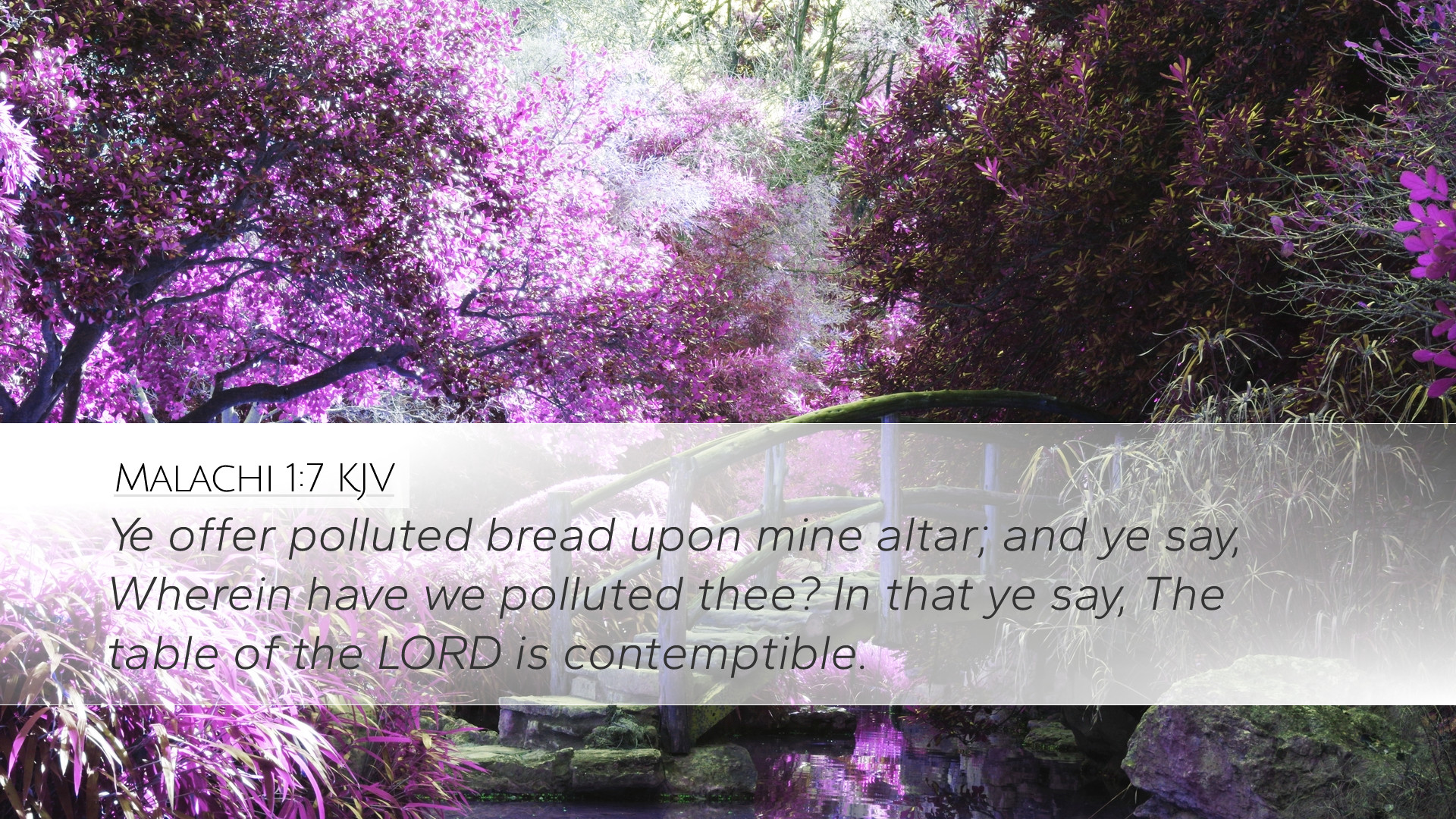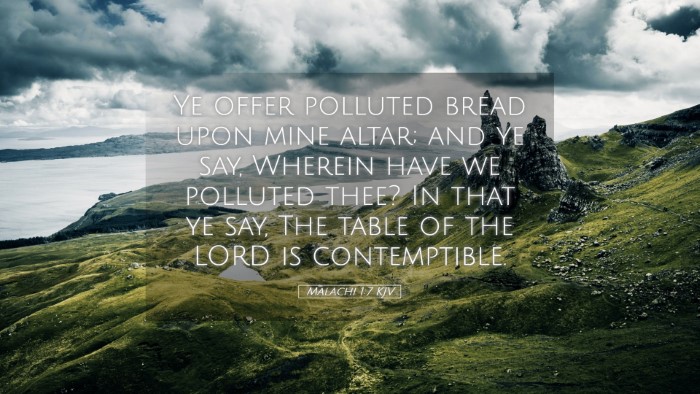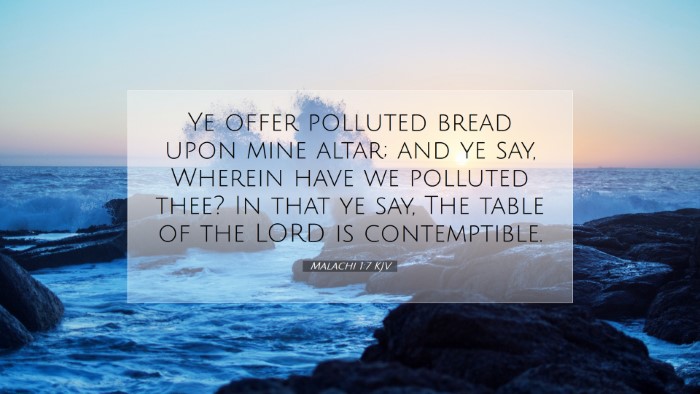Old Testament
Genesis Exodus Leviticus Numbers Deuteronomy Joshua Judges Ruth 1 Samuel 2 Samuel 1 Kings 2 Kings 1 Chronicles 2 Chronicles Ezra Nehemiah Esther Job Psalms Proverbs Ecclesiastes Song of Solomon Isaiah Jeremiah Lamentations Ezekiel Daniel Hosea Joel Amos Obadiah Jonah Micah Nahum Habakkuk Zephaniah Haggai Zechariah MalachiMalachi 1:7
Malachi 1:7 KJV
Ye offer polluted bread upon mine altar; and ye say, Wherein have we polluted thee? In that ye say, The table of the LORD is contemptible.
Malachi 1:7 Bible Commentary
Commentary on Malachi 1:7
Malachi 1:7 (ESV): “By offering polluted food upon my altar. But you say, ‘How have we polluted you?’ By saying that the Lord’s table is contemptible.”
Introduction
This verse sets the tone for the broader themes addressed in the book of Malachi, focusing on worship, reverence for God, and the sincerity of offerings presented to Him. The dialogue-centric style underscores a profound disconnection between God and His people. There is an urgent need for theological reflection among pastors, students, and scholars regarding the implications of spiritual apathy that Malachi confronts.
The Context of Malachi's Message
Malachi prophesied during a time of economic and spiritual decline after the return from Babylonian exile. The people of Israel struggled with their identity and commitment to the covenant. This malaise is starkly presented in the verse, representing the spiritual apathy prevalent in worship practices. The offerings being brought to God were neither pure nor acceptable, reflecting a misunderstanding of the holiness of God and the nature of true worship.
Public Domain Commentary Insights
Matthew Henry's Commentary
Henry emphasizes the importance of the quality of sacrifices. In context, the offering of polluted food illustrates a profound disrespect towards God. He argues that the people had grown complacent and presented to God what cost them the least, mirroring a broader societal trend towards irreverence:
- The idea of 'polluted' food signifies more than just physical offerings; it speaks to spiritual integrity.
- Henry highlights the challenge of complacency, suggesting that such indifference to God is a major affront to divine holiness.
Albert Barnes' Commentary
Barnes focuses on the relational aspect of worship summarized in the phrase “the Lord’s table is contemptible.” He emphasizes the bidirectional nature of worship—both God’s holiness and humanity's frail response:
- Barnes notes that the contempt shown to God derived from his people’s perceptions that God was unworthy of their best. This fundamental misunderstanding leads to offerings lacking true value.
- He posits that God desires authentic worship as a reflection of His character and holiness.
Adam Clarke's Commentary
Clarke offers a detailed analysis of the historical context and linguistic elements of the Hebrew text. He draws connections between the temple practices of ancient Israel and contemporary worship:
- Clarke articulates the seriousness of bringing imperfect offerings and connects this to the larger theological context of sacrifice in the Old Testament.
- He points out that the degradation of the temple’s practices signifies a decay in the community's moral and spiritual life, making the call to repentance even more urgent.
Theological Implications
The verse invokes several crucial theological reflections:
- Holiness of God: God’s holiness requires that offerings be made with sincerity and purity. The acknowledgment of God's sovereignty and purity in worship is paramount. A lack of understanding here echoes throughout the Scriptures (Hebrews 12:14).
- Authenticity in Worship: Worship must be genuine. The warning against insincere worship leads to consideration about contemporary worship practices and their authenticity. This leads to questions about multifaceted expressions of worship being delivered in sincerity.
- Moral and Spiritual Responsibility: The moral decay of the people reflects a broader trend of ethical decline when religious observance lacks ground in true conviction and reverence. A reminder exists for every generation regarding the necessity of aligning actions with faith.
- God’s Desire for Relationship: This passage exemplifies God’s yearning for genuine interaction and relationship with His people, where familiarity does not lead to contempt.
Practical Application
For pastors and leaders, Malachi 1:7 serves as a crucial reminder of the importance of fostering a culture of genuine worship within the congregation:
- Encourage congregants to engage deeply with their faith, to bring their 'best' to God in every aspect, not merely in material ways but also spiritually and emotionally.
- Address issues of complacency in worship practices through teaching about the holiness of God and raising awareness of what constitutes acceptable worship.
- Promote authenticity by creating spaces where congregants feel free to express their struggles and doubts candidly, leading to the growth of genuine faith communities.
Conclusion
Malachi 1:7 is more than a historical comment; it embodies a timeless exhortation to recognize the gravity of our approach to God. The reflections gathered from various public domain commentaries enrich our understanding of this text, offering pastors, students, and theologians valuable insight into the nature of worship and the character of God. As we strive to emulate the quality of our offerings, we hold a responsibility to lead with integrity and to cultivate a profound reverence for God’s holiness.


